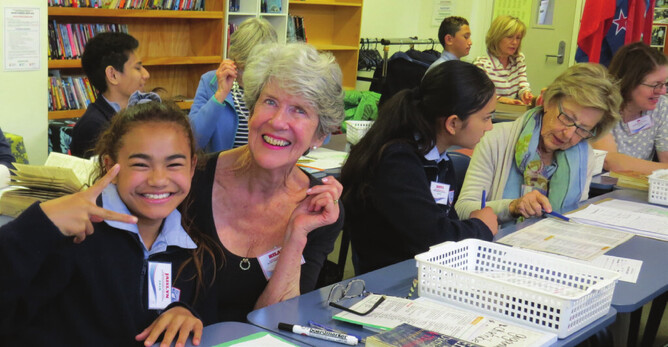This post first appeared in our newsletter ‘Connections’ ins the summer of 2020/2021.
REP is a programme that brings community volunteers into a school setting, to support Year 9 students with literacy development and transition to high school. Deb Cane, who co-ordinates at two locations, has some valuable thoughts to share.
1. Recruitment
Find the places where the people you are looking for are likely to be. Deb tends to advertise in libraries, service clubs like Rotary, or through the University of the 3rd Age. She also stresses the importance of ‘word of mouth’. Many of her new volunteers are friends of current volunteers so a good programme reputation is vital.
2. Reassurance
Give reassurance about perceived challenges for volunteers, who can be worried about the abilities or skills they have to offer. Assure them that the task is within their capabilities and that help is readily available. Deb says that all her volunteers need is an interest in young people, good humour and a pen.
3. Programme purpose
Be clear about the purpose and structure of the programme. If it isn’t a great match, encourage the volunteer to find an organisation with a better fit.
4. Training
Find a time for training that suits most of your volunteers. People prepared to give time on a regular basis are often very busy and organised. Deb found it was best for her groups to hold short training sessions, half an hour before the mentoring session.
5. Responsibility
Be aware of possible unintended consequences of the mentor/mentee interaction. Discuss potential problems in your training sessions but be prepared to talk to individuals if the need arises.
6. Regular contact
Volunteers need some form of positive regular interaction with the coordinator to build team momentum. Deb sends out a brief email each week seeking confirmation that the mentor will attend their allocated session. She also attends each classroom session and makes a point of chatting to mentors.
7. Recognise that volunteers are human
Volunteers want to uphold their commitment, but sometimes life is messy. Deb says flexibility is the key. Because REP runs on a fixed timetable operated by the school, Deb works with teams who back each other up. If a regular mentor is away, she sees it as her role to ensure each student has a mentor every session.
8. Communication
It is important for volunteers to feel that their time and efforts are worthwhile. This feedback varies for different programmes, but for REP volunteers it is really important that the school shares academic progress results. This shows how the programme is making a difference.
9. Create a team feeling
Volunteers like to know there is a plan and they like to feel collegial. Taking time to meet each other socially is important. Most of Deb’s group attend morning tea in the staffroom when they are at school. Training sessions also have a social element.
10. Enjoyment
Volunteering should be an enjoyable experience. REP mentors value doing something that benefits others, the one-to-one engagement, the warm interactions with young people, often of a different culture – and they enjoy the smiles (as do the students).
Special thanks to Deb and all those who volunteer for the REP programme.

